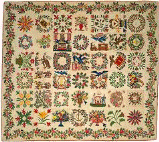Textile Society of America

Textile Society of America: Symposium Proceedings
Date of this Version
2000
Document Type
Article
Citation
In Approaching Textiles, Varying Viewpoints: Proceedings of the Seventh Biennial Symposium of the Textile Society of America, Santa Fe, New Mexico, 2000
Abstract
South Asia is home to an incredibly rich variety of embroideries that include folk, courtly, ritual, and commercial traditions. The scholarly literature on South Asian embroidery has been meagre however and historically emphasized professional embroideries at the expense of the folkl. With few recent exceptions2 folk embroidery in the Sub-Continent has most often been described and classified without reference to the women who make it or the specific cultural traditions that support and give meaning to it3. These 'characterising' accounts of folk embroidery are likely the result of historic circumstance and ancient bias4 but they are also the result of certain methodological shortcomings. My research attempts to counter these shortcomings through the use of embodiment and focusing not strictly on embroidery, but embroidering-the processes involved, their contexts, change, and women's perceptions of meaning. Despite the growing influence of theories of praxis and embodiment on the social sciences5 and their demonstrated potential for furthering understanding of gender and textiles6, there has yet to be an experiential, embodied account of embroidery in South Asia. This paper will examine the potential of embodiment to further women-centred, praxis-oriented research, enhancing understanding of embroidery and women's relationship with it.


Comments
Copyright © 2000 by the author(s).